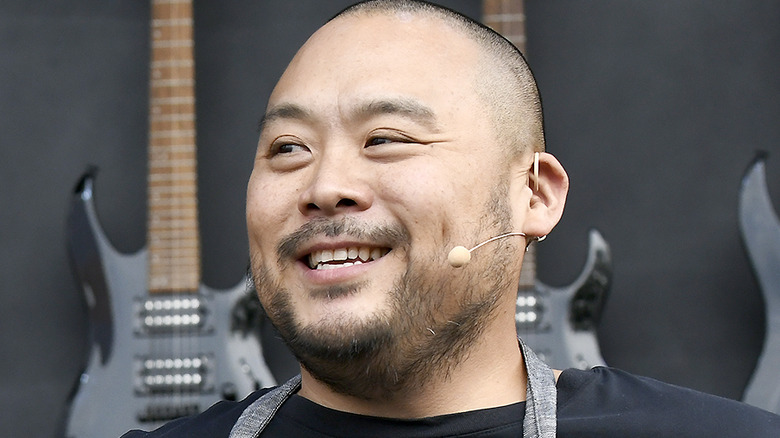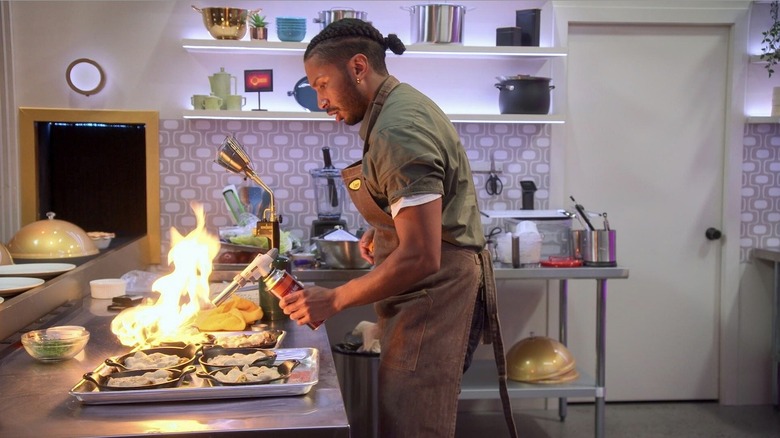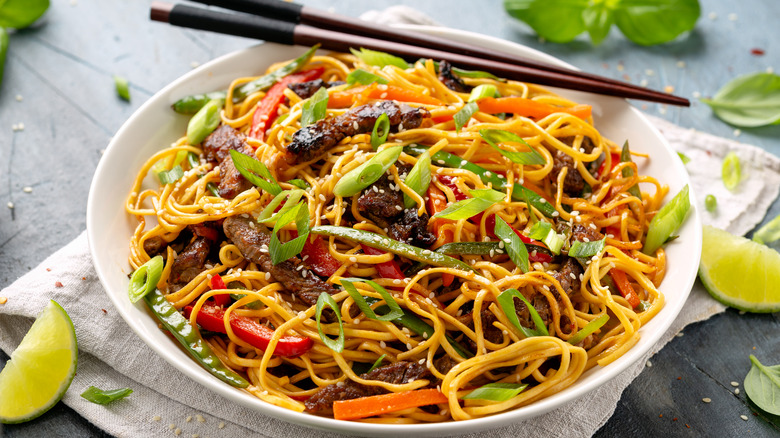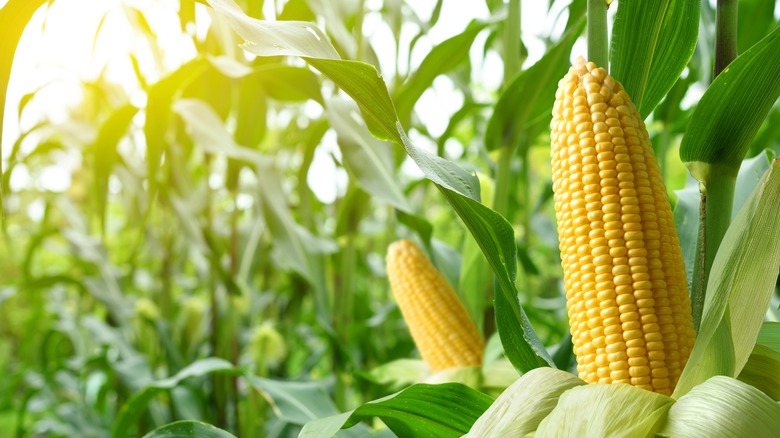David Chang's Secret Chef Is Changing The Game For Cooking Competition Shows - Exclusive Interview
It's no secret that David Chang is a top-tier chef — but his new show sure takes anonymity to the next level. The Hulu Original series "Secret Chef" serves a new take on cooking competition shows with David Chang as executive producer. What's the real twist? There are no judges. In fact, the contestants vote each other off of the show themselves — secretly, of course. That means you won't see Chang taking on a typical host or judge role that you might expect from cooking competition shows, but as he told us, that's rather the point: "Secret Chef" is putting genre formulas aside to bring fresh storylines to viewers.
In an exclusive interview with Mashed, the chef and founder of the Momofuku restaurant group revealed his inspiration for "Secret Chef," the popular food show he would choose to be on as a contestant (shoutout to Guy Fieri), and the meals he's cooking up this summer (three words: toasted sesame oil). Chang also gave us some tips on how to season a popular warm-weather side — corn — to pair with your outdoor barbecues.
Secret Chef brings something new to the table
I'm curious what inspired this new show, because the mystery behind it is not something I've ever seen before.
We were working on this for a while, and it was about three or four iterations or different shows that slowly merged into one. The basic premise is that almost all the food shows, the plot lines, et cetera, have already been done. There's almost nothing new for the audience, in my opinion. That's a credit to everyone that's been making all this great content; it's a lot of interesting storylines. It's rare if you watch something — if you watch this kind of stuff — where you don't expect what the next thing is going to be. So trying to keep it fresh, trying to keep it exciting and new, was a priority for us.
We wanted to make sure that it was a game show and there was strategy involved, and it wasn't necessarily getting the best chef with the most delicious things humanly possible. That's something we've learned on making a bunch of shows. People watch food shows not because they want to eat it, and not from a cook's perspective per se, but because it's engaging in a different way and it's entertaining and it's fun.
That was our other main North Star — how do we make sure that the strategies that we institute are fun and engaging? The food is not secondary per se, but it's not as primary as people might expect us to do. [Thirdly], we wanted to get a bunch of fun, interesting people from all walks of life with differing skill sets, and it was important that somebody that may not be super skillful could still win this game.
Contestants have an even playing field
I wanted to ask you about that because they are either home cooks, restaurateurs, or seasoned chefs. Do you feel like it's an even playing field?
If you watch the season, it makes it pretty even, because there's a lot of strategy involved in terms of letting people know who you are, your alias, and that is the great leveler in terms of your ability to cook. Everyone there can make delicious food. Let me make that as a prerequisite — you have to make tasty food. But what I appreciate [is that] the more I'm in this business, the more I realize that a lot of the great ideas aren't from a traditional culinary, professional chef background, and great food can be made from a variety of angles. That was what we wanted to demonstrate. Someone that is a home cook — we all know that person. They're great, they can make delicious food, but they may not be able to compete on, say, a professional chef series. This gives us a little bit of a motley crew, and that was intentional.
I like that idea a lot. What was the thought process behind not having judges and having contestants rate each other's plates? What do you think it brings to the show?
That's something that I've taken from my own experiences. When you're in kitchens, you don't need to manufacture any drama. The drama can happen with the people themselves ... Those rooms where you might be making a dish for your peers [is] the most stressful thing possible. I don't think you need to add a dramatic element. The dramatic element is not having a judge and making it not necessarily mysterious, but there's nowhere to hide. That changes the strategy again in this season.
Sometimes peers often tend to be more candid, which could add to the drama as well.
Correct. I've been at those judges' tables too, and I don't think it always ... It's different when everyone's there simultaneously, and it's not always the case when you have a judges' table and a judge going around. Listen, I love those programs as much as anybody else. But our desire was to do something a little bit different that is still familiar — again, not trying to do the same shows that have been done time and time again.
There's no shortage of surprises
Is there something that you learned while producing the show, either from the chefs or maybe a cooking method or tip that you use in the kitchen presently?
Well, this is a game show and there were plenty of lawyers present. There's nothing you can do because this is all FCC-compliant. That was something where I was like, "Wow, this is as clean and unobtrusive as possible from the production side."
Watching it from the screens as it's happening, it's almost like a sporting event because you're always surprised at the things that happen. Without saying and revealing too much, we all judge. You watch that first episode — you're going to judge, and you're going to think whoever is the best, and it's not always the case. Even for me, I was like, "Wow, this is a real surprise," as the season unfolded.
I don't know how much you'll be able to answer this question, but without giving too much away, is there a contestant that totally surprised you?
All of the contestants surprised me. Without revealing too much, there are plenty of surprises throughout the season, and that's the dynamic of what "Secret Chef" is, where you're leaving the voting to the peer group. It is anonymous, so you're getting ... It's a different strategy. Again, what you think might be great may not be great, and you don't know if it's great because there's actually collusion on the other side and they're voting. The game theory is what changes the traditional food judging element. Because of that, it's really hard. I was constantly surprised by many of the contestants, whether they did well or didn't do well per episode.
I have a fun question for you going off of that. Aside from "Secret Chef," if you personally could be a contestant on any other cooking competition show, which one would it be and why?
Oh, Lord. What's Guy Fieri's game show?
"Guy's Grocery Games."
That's the one I would do. It seems fun. I don't know if I could put myself through the rigors of having the cameras on and having all of this pressure. It's a very different thing, and kudos to every single person that goes through it, but that's a little bit too much for me. I need to laugh a little bit more. That one would be fun — even if I did terribly, it would be fun.
It's stressful when you're cooking, to say the least. But when you have cameras on, it's a whole different ball game.
Absolutely.
Don't underestimate toasted sesame oil
I'm going to switch gears to your home cooking. What would you say is your favorite underrated ingredient to add to noodles?
Sesame oil. If you're going to make noodles, and something that is not, say, Western and European ... toasted sesame oil — just a little bit — goes a long way in changing the flavor and the nuance of a dish. I actually served that to my son this morning. I'm not making that up, because especially the youngest one refuses to eat anything that is not a ... He doesn't like breakfast foods. He wants to eat dinner for breakfast.
I made some Sōmen noodles, and I put a little bit of the Momofuku soy sauce in there and a little bit of our toasted sesame oil. If you don't have our products, that's fine. Toasted sesame oil can actually go bad quite quickly too, so you might want to check. But a little drop, like one drop in a four-ounce bowl of noodles with a little soy sauce ... I put a little breakfast sausage in there as well. That was his breakfast. He doesn't like eggs.
[For] my other son, I had to put eggs in there and the breakfast sausage. He wanted [it] a little bit more seasoned, so I put a little bit more soy sauce. That's what they ate for breakfast today. If I don't add the sesame, it becomes one note, more of umami and salt. The toasted fragrance of the sesame goes a long way. A little goes a long way — you do not have to add a tablespoon.
That's funny that you said that, because I just purchased the toasted sesame oil the other day and added it to sauce, and it's a total game changer. I wish I knew about it earlier.
Well, I appreciate it. Thank you. You don't have to always pair it with Asian ingredients. A caprese salad sounds maybe a little bit left of center, but a couple drops of toasted sesame oil changes it completely in a good way and marries well with the extra virgin olive oil, the basil, and the vinegar. It's a pretty versatile ingredient. But again, be very careful with the amount that you use.
A microwave is a good resource for summer corn
Is there a summer ingredient that you are excited to use this season? Anything you're looking forward to?
If I was in New York, it would be Tristar strawberries, or ... We have this healthy debate with my friends, East Coast [and] West Coast. People in New York tend to think that their corn and tomatoes are better than people in California's corn and tomatoes. I think they're both good. But I'm really looking forward to summer corn. That's the best to me, and stone fruit. We're going to have pluots and apricots and peaches coming into season right now, so that's always amazing because you can't beat that flavor.
With summer corn, how do you normally go about seasoning? Do you have any tips?
My tip number one — microwave it. You can put it on a plate and clean the corn to remove the husk and microwave one. If you have two ears of corn, you can do that for two minutes, two and a half minutes. You can season that with salt or butter or whatever you want.
Another thing I like to do is take my corn off the cob, because I find that I don't like getting corn stuck in my teeth all the time when I'm eating it off the cob. My kids love it that way. I'll put a small bowl in a big metal bowl and then rest the corn cob on that metal bowl so there's a firm base. I'll slice the corn kernels off the cob, and everything's in the bowl. You can microwave all that corn yourself or give it a quick sauté in a little butter. That's fantastic.
I often microwave my vegetables and I thought it was taboo, but now I'm going to do it with corn.
Listen, a microwave is just a steamer. It's a steamer with an electronic button. That's all it is.
Fair. You mentioned this briefly earlier, but is there anything that you're doing homemade that you've been cooking up recently? I saw you made a potato bun from scratch for a burger. That looked good.
I've been trying to make a donut. Here's the thing — I'm not trying to follow a recipe or try anything out, and it's not as fruitful as I hoped. [I'm] making a lot of donuts right now, and I'm ruining donuts for myself. Clearly, we're making a lot of burgers right now, because we're testing something out in our studio ... a lot of hamburgers, and I'm ruining burgers for myself as well.
Well, I'm sure they all come out tasty, so you can't go that wrong.
I hope so. But you didn't try this donut I made yesterday. It tasted like a fried bagel — it was terrible.
All 10 episodes of "Secret Chef" are now available on Hulu. Check out David Chang's Instagram to keep up with his latest projects and home cooking.
This interview has been edited for clarity.





